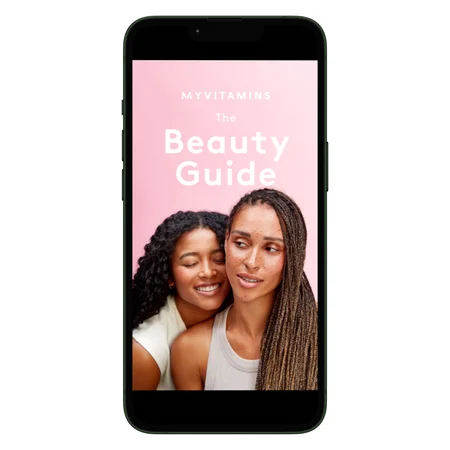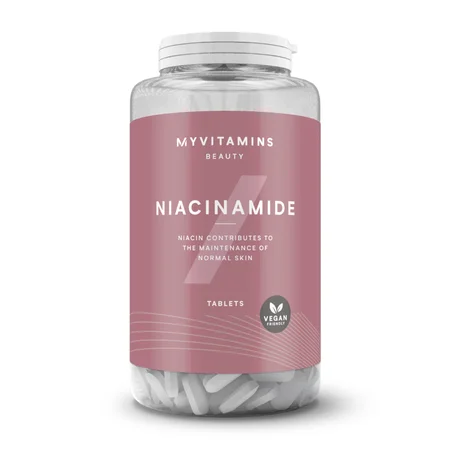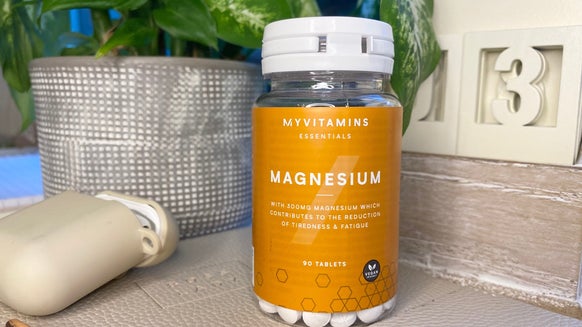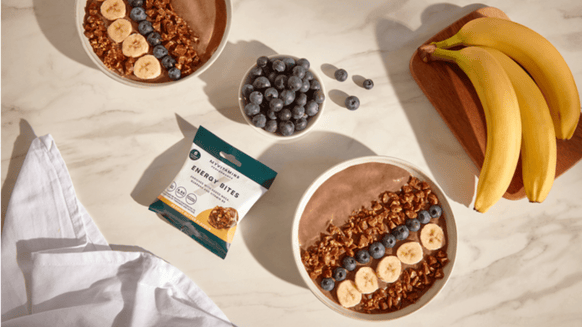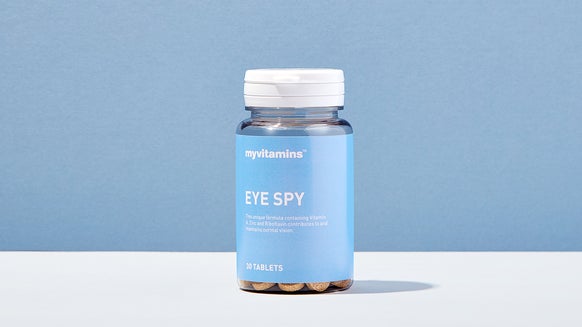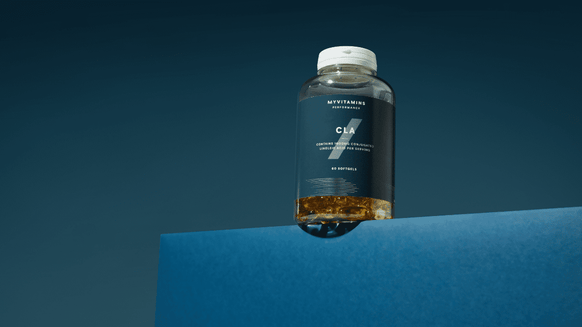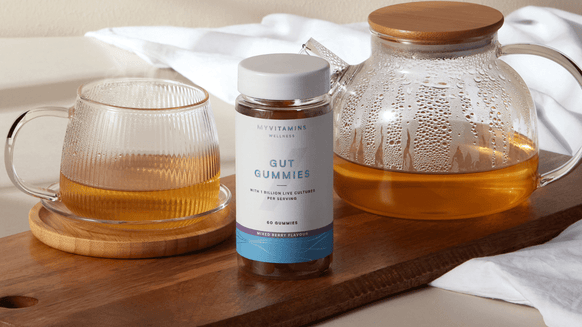
Niacinamide, a form of vitamin B3, has gained significant popularity in the skincare community. But what makes this ingredient so special?
Known for its versatility, niacinamide can help your skin health in a range of ways, from breakouts to signs of ageing.
In this article, we'll explore the ins and outs of niacinamide, including its benefits, how it works in your skincare regimen, and why it’s considered a powerhouse for achieving a glowing complexion.
- What is niacinamide?
- What does niacinamide do for your skin?
- Niacinamide benefits
- How to take niacinamide supplements
- FAQs
What is niacinamide?
Niacinamide, also known as nicotinamide, is a form of vitamin B3, an essential nutrient that supports many cellular processes in the body.
This water-soluble vitamin is found naturally in foods like meat, fish, milk, eggs, green vegetables, and cereals. But most people know it as an ingredient in skincare and dietary supplements.

How To Get Glowing Skin | Summer Skin School
Niacinamide plays a crucial role in converting food into energy, maintaining healthy cells, and repairing DNA.
In the beauty world, it offers a range of benefits that make it a popular ingredient in many skincare formulations.
What does niacinamide do for your skin?
Niacinamide works as a multi-tasking powerhouse for your skin, tackling many aspects at once.
It strengthens the skin barrier, helping your skin defend itself against environmental stressors such as pollution and ultraviolet (UV) rays. This vitamin also boosts the production of ceramides, which are lipids (organic fatty compounds) that help keep your skin hydrated and plump, with a youthful appearance.
Its anti-inflammatory properties can calm irritated skin and reduce redness, making it great for people with acne, rosacea, or other conditions.
Niacinamide also helps control oil production, which can minimise the appearance of pores and prevent breakouts. Plus, it evens out skin tone and reduces dullness, giving your skin a brighter, more radiant look.
Niacinamide benefits
Niacinamide brings a range of benefits to the table, making it a versatile and highly valued skincare ingredient. Here are the top ways it can help your skin look and feel its best:
1. Stronger skin barrier
It enhances your skin’s natural barrier, helping to lock in moisture and protect against environmental damage.
2. Reduced inflammation
Niacinamide's anti-inflammatory properties help soothe and calm irritated skin, reducing redness and blotchiness.
3. Anti-ageing properties
It can help reduce fine lines and wrinkles by boosting collagen production and improving skin elasticity.
4. Oil regulation
Niacinamide helps control excess oil, making it perfect for oily and acne-prone skin.
5. Fades hyperpigmentation
It can lighten dark spots and even out skin tone by inhibiting the transfer of melanin to the skin's surface.
6. Improved texture
Regular use of niacinamide can lead to smoother, softer skin with a more refined texture (1).
How to take niacinamide supplements
As well as using it topically in skincare like Skin Glow Serum, niacinamide is also available as a supplement. When choosing a niacinamide supplement, follow the dosage recommendations on the product label or from your healthcare provider.
Research into typical dosage varies, however, around 300-500mg each day is recommended and deemed safe and effective for most adults. It’s also recommended to take these supplements with food to improve absorption and reduce the chance of stomach upset.
For example, Myvitamins Niacinamide tablets contain 450mg of niacinamide in a convenient daily supplement, designed to support your skincare routine from the inside out. These vegan-friendly tablets can be especially useful for individuals who may lack niacin within their diets, for example, those who do not consume animal-based products.
Incorporating niacinamide into your routine, whether through skincare or supplements, can offer significant benefits for your skin and overall health.
Talk to your doctor
Myvitamins is not making any medical claims in this article. If you are looking to add niacinamide into your routine as a dietary supplement or part of your topical skincare, or are concerned about any of the topics mentioned in this article, consider talking with your doctor or dermatologist.
Take home message
Niacinamide is a powerhouse ingredient that can address a wide range of skin concerns, from strengthening the skin barrier and reducing inflammation to controlling oil production and brightening the complexion.
Its versatility makes it the perfect addition to any skincare routine, whether applied topically or taken as a supplement. Understanding how niacinamide works and its numerous benefits can help you make informed decisions to enhance your skin health.
If you’re looking to improve your skincare routine from the inside out, consider implementing a niacinamide supplement into your day.
FAQs
What does niacinamide do to your skin?
Niacinamide provides numerous benefits for your skin. It strengthens the skin barrier, helping to retain moisture and protect against environmental stressors like pollution and UV rays. Its anti-inflammatory properties soothe irritated skin and reduce redness, making it great for acne and rosacea.
Niacinamide also controls oil production, minimises the appearance of pores, and prevents breakouts. Additionally, it evens out skin tone and brightens the complexion by reducing hyperpigmentation and dullness. Overall, niacinamide promotes healthier, more radiant skin.
Is it okay to use niacinamide every day?
It is perfectly safe to use niacinamide daily, and regular use may even enhance its benefits. It's generally well-tolerated by most skin types, including sensitive skin, and fits easily into both morning and evening routines.
Just follow the product instructions and consider pairing niacinamide with other beneficial ingredients, such as hyaluronic acid and vitamin C, for the best results.
Can I use hyaluronic and niacinamide together?
Yes, you can use hyaluronic acid and niacinamide together. They work well as a pair: hyaluronic acid hydrates your skin by attracting moisture, while niacinamide strengthens the skin barrier to lock in that hydration. Together, they help achieve plump, healthy skin. Start with hyaluronic acid to draw in moisture, then apply niacinamide to keep it locked in and add extra benefits.
Who should take niacinamide?
Niacinamide is suitable for nearly everyone, no matter their skin type or age. It's especially useful for individuals with acne, oily skin, rosacea, or sensitive skin due to its calming effects.
Those with oily skin can benefit from its ability to regulate oil production, while it also provides moisturising and anti-ageing benefits for dry or mature skin.
Additionally, anyone looking to brighten their complexion and even out their skin tone will find niacinamide helpful.
If you have specific skin issues, it's best to consult a dermatologist before adding new products to your routine.

Levin, J., & Momin, S. B. (2010). How much do we really know about our favorite cosmeceutical ingredients?. The Journal of clinical and aesthetic dermatology, 3(2), 22–41.
Gehring, W. (2004). Nicotinic acid/niacinamide and the skin. Journal of Cosmetic Dermatology, 3(2), 88–93. https://doi.org/10.1111/j.1473-2130.2004.00115.x
Berson, D., Osborne, R., Oblong, J., Hakozaki, T., Johnson, M., & Bissett, D. (n.d.). Niacinamide: A Topical Vitamin with Wide-Ranging Skin Appearance Benefits. https://www.velaskincare.com/wp-content/uploads/2023/03/75d6a644a69123d1158249115e558e2c5888.pdf
